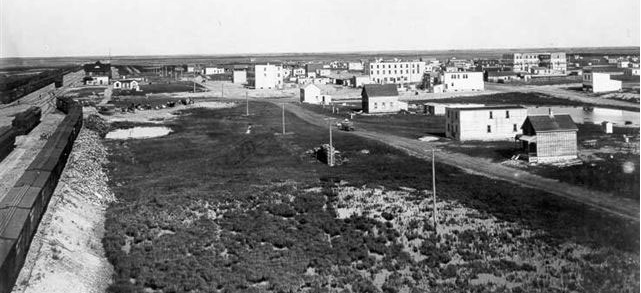Melville, Saskatchewan, located on Highway 15 northeast of Regina, is the smallest official city in its province. It was named after the president of the Grand Trunk Railway and the Grand Trunk Pacific Railway, Charles Melville Hays. It’s the birthplace of Sid Abel, who played centre for the Detroit Red Wings’ “Production line” alongside Gordie Howe and Ted Lindsay, and has his name etched on the Stanley Cup three times.
It’s also the name of what is, perhaps, the Rheostatics’ best album: an almost hour-long slice of Canadiana, featuring a massive, noisy cover of Gordon Lightfoot’s famous “The Wreck of the Edmund Fitzgerald.” The record might be their most cohesive in sound and tone of their entire career, even though it’s still filled with the kind of abrupt switches that one would expect from a Rheos album. It was the album that kickstarted their modest success here in Canada after the Barenaked Ladies heard it and asked the Rheos to tour with them. Shortly before their Winnipeg gig, their van broke down in Brandon, and they took a $350 cab ride to the show, getting there only 15 minutes before they were set to go on.
The drive west down the undivided, uneven 15 is a bit of a scary one late at night, even with the gentle melody of “Northern Wish” playing over the stereo. It’s hard to see much farther than just in front of you, and there are foxes and coyotes in the bushes just waiting to run in front of the car.
Melville is home to two sports teams named the Melville Millionaires: a hockey team in the Saskatchewan Junior Hockey League, and a baseball team in the Western Major Baseball League. The latter last won a championship in 2002, shared (somehow) with the Moose Jaw Miller Express.
Although Melville, the album, was actually named after pedal-steel guitarist Lewis Melville, many have grown to associate it with the town, including the residents themselves. One of the Rheostatics’ tours found them play the Waverly Hotel in town, and they were showered with Millionaires memorabilia, including being presented with a jersey on stage by the mayor at that time, Jim Walters. It’s also where, as Dave Bidini writes in On a Cold Road, he felt like they finally “existed.”
There’s a chance it could be the massive fish on the cover, laid tummy down against a sprawling wheat field, conjuring up images of the open prairies.

But an even more likely culprit is the album’s best song, “Saskatchewan.”
“Saskatchewan” tells the story of a young man on a ship, arriving at his destination, only to be accosted by another, hostile group of men. He recants to his love, Caroline, through an inner dialogue, dreaming of home and remembering the places they’d hide “in a church in Saskatchewan.” It’s a poignant, emotional, and beautiful song about longing for home and for someone that can likely never go back.
Melville is the sort of prairie town that protagonist may have been dreaming of: a welcoming community, the kind of place that makes memories. If you’re ever going west on the Yellowhead, stop by and grab some Millionaires stuff. But don’t forget to bring along the album.
—
Matt Williams is a writer and musician with a decent fantasy football team. Follow him on Twitter @WaterInHell .
For more, follow @SpectatorTrib on Twitter.
